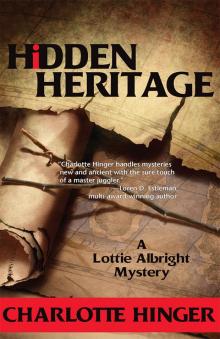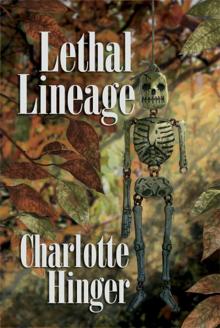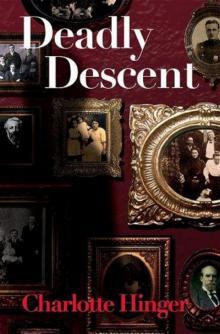- Home
- Charlotte Hinger
Deadly Descent Page 2
Deadly Descent Read online
Page 2
I smiled. The lofty Rubidoux had obviously settled close to Nicodemus, Kansas, and blacks there had formed the first school district in Graham County. This colony had preceded the great migration of African Americans who left the South for Kansas in 1879.
Due to the strain of the war, the hardships of the new life, and her sense of grief over her abandonment by the Negroes upon whom she had lavished nothing but kindness all her life, Great Great Grandmother Clarissa was plagued by melancholy and a mere shadow of the woman she was in the South.
When the Negroes tried to organize the county, Jonathan fought these greedy politicians tooth and toenail. In fact, his very own slaves popped up in all kinds of county offices, and one even was county clerk. Naturally, having personal knowledge of their treachery he considered it his duty to warn other deserving white folks in the county that the man was a fool and illiterate and none of their transactions would be kept private. Until he died, Jonathan protested against blacks holding office where they would be privy to white folks’ business and made his children swear they would take up the cause.
The cause. Keeping blacks out of politics? Negating the whole civil rights movement? Tears started again. I specialize in African American history. Were the early Rubidoux Klansmen?
I’m proud to say that the children and their descendents have carried on this tradition and we even had a Rubidoux doing his best to block the disastrous outcome in Brown v. Board of Education. We believe the races should be segregated, and now, I’m proud to say, we have another Rubidoux descendent, senatorial candidate, Brian Hadley, who understands the importance of genetic purity.
I sat with my hands folded in my lap for a moment. How could Fiona not have been upset the first time she read the story? Even if reading about her family’s racial history hadn’t thrown her into a tizzy, how could she have tolerated the implication that Brian went along with this attitude? Was the woman so stupid she couldn’t see what it would do to his campaign?
I went to the coffee pot, tossed the old filter, walked to the restroom to rinse out the old sludge, then headed back to complete the rest of my closing ritual. But the routine couldn’t lift my mood.
Sometimes the room seemed to fill with the spirits of the people who had lived in this county. On top of the Rubidoux fiasco, a number of the stories I’d edited this week dealt with accidental deaths.
Since the county was founded, children drowned in ponds or died from infections that went untreated. They were run over by wagons or gored by bulls. Women got scalded or cut during butchering or burned during canning. Men were gassed digging wells or caught fire or had limbs sheared off by equipment. The list was endless and we still had our share of accidents in the twenty-first century.
Western Kansas was a hard row to hoe. I recalled the horrified expression on Josie’s face when she visited Gateway City for the first time.
“You’ll die,” she’d snapped. “Your soul will shrink into a little rock. You’ve never liked the wind. You’re an educated woman, Lottie. What will you do for entertainment?”
“It’s not that bleak. Besides, there’s always Denver. We do have cars out here, you know.”
“Denver is three hundred miles away.”
“That’s nothing. A morning’s drive.”
“Lottie, are you sure? You’re marrying a man with grown children older than you are.”
“I’m sure of the man, Josie. That’s all that matters to me right now.”
Seven years later, I was still sure of the man. Josie had been right about the soul-shrinking incessant wind, but as far as my work as a historian was concerned, I’d hit the mother lode. Originally seen as part of the Great American Desert, academics tended to ignore Wwestern Kansas. There were enough unwritten stories here to keep me publishing for the rest of my life.
I adore this county. For over a century, its families had become tangled in little webs of intrigue. Known and unknown.
As I neatened my desk, my thoughts kept returning to Fiona. The woman’s sobs seemed to remain in the room. Even given Fiona’s capacity for theatrics, her distress did not seem staged.
It had been a long day, ending an absolute bitch of a week. I loaded my briefcase with Zelda’s working copy, and other family stories that needed editing, turned out all the lights, and left the courthouse.
I would call Zelda when I got home and set up a meeting. Even though I’d retain the story now on file, together we could come up with another one for the book. I would urge her to write about the family’s achievements. Or something.
Lightning flashed again, but the clouds were moving further west. Irritated at being cheated out of rain, and having to drag work home, I hurried toward my Tahoe. Josie was coming this weekend along with two of Keith’s daughters and our grandchildren. My sister drove out twice a year for long weekends. The visits were to convince herself that she had forgiven me for choosing to live here.
During these bi-yearly treks, she had met Tom, Keith’s son, and Angie, his middle daughter, but by some quirk of fate she had never met Elizabeth and Bettina. Career women, they couldn’t get away when Josie chose to come. They said.
I wanted all the children to make a special trip home to honor our seventh anniversary. But two days ago, Angie called. She absolutely, positively had to work. Tom called last night. He had a special assignment. Keith assured him it was no big deal. We would see him in a couple of months for the opening day of pheasant season. Our seventh anniversary was a big deal only to me.
As if I weren’t wired enough already, my sister would be hearing our family’s music for the first time and it wouldn’t be the same without Tom and Angie. Josie had sweetly consented to bring her own violin.
“It’s the land that’s flat, not my life,” I kept telling her.
I drove steadily toward our home on a hill eight miles north of town. On a clear day you can see its white three-story exterior from miles away. It was huge and wonderful, with enough turrets and hiding places to drive children crazy with delight.
When Josie saw the colossal sprawl of Fiene’s Folly the first time her eyes sparked with surprise. She was fun to watch. She imagined she always maintained a psychologist’s inscrutability, but she was not quite quick enough for me. I knew her too well.
“But we’re already rich,” she said in verbal shorthand, relying on this to fill in all the gaps. That we had trust funds. That a house wouldn’t compensate for a life.
“I didn’t marry him for his money.”
“He’s still a dirt farmer, Lottie.”
“He’s an educated man. A veterinarian.”
“So? Why doesn’t he practice? Contribute something.”
I’d had enough sense to shut up. Keith’s main income was from wheat and cattle. He wrote occasional medical and economic pieces for veterinary trade magazines and he did have a very informal practice, along the lines of helping thy neighbor.
Truth was Keith couldn’t stand high-strung women with yapping little dogs.
Josie owned a miniature shih tzu. On our farmstead we had two real dogs. Totally non-neurotic border collies.
Josie would have been surprised at the net worth of my dirt farmer.
Chapter Three
I passed through the mud room into our kitchen/family room. I had designed the light golden oak cabinets. A number of the doors bore stained glass insets. In winter, the floor-to-ceiling fireplace dominating the north wall warmed the facing tan leather sofa and flanking chairs. Ample reading lamps invited curling up with a book.
The woodwork gleamed. It would even pass Elizabeth’s inspection, though the credit went to hired help. Keith’s oldest daughter doesn’t hold with women who don’t do all their own work.
There was a note from Keith on the island saying he had been called over to the Arley farm to look at a cow. I threw myself into a final orgy of housewifely fussing.
Then I called Zelda St. John. The second quick scan of her story had sent Fiona into a tailspin, not the first read.
Perhaps she knew the reason, and would tell me during our rewrite session.
There was no answer.
I had hoped Elizabeth would not be the first to arrive, but her little yellow Volkswagen came buzzing up the drive. Single, one year older, and five inches taller than I, she could whip me verbally with one tongue tied behind her back.
I pulled myself together and flung open the front door.
“Hello,” I called cheerily. “Did you have a good trip? Can I help you carry things in?”
I felt a step-mother’s awkwardness in extending the hospitality of a home that had always been hers. I wished she could understand it was still. Keeping my maiden name was my only move that met with her approval.
Elizabeth is a “poverty lawyer” in Denver. She works out of a wretched little storefront with like-minded zealots. She dresses like Cinderella before the fairy godmother hit. I think she’s affected as hell.
“I can manage. Where’s Dad?”
“Out doctoring. He’s on his way home by now I hope.”
“Good.” She breezed past me carrying two suitcases. Fierce, Junoesque, she is a dazzling beauty with short wheat-colored hair. She returned from her room, flipped her cell open and scowled at me. I shrugged. Our spotty service is not my fault.
“So. What have you been up to?” Elizabeth is quite decent to me as long I keep the focus on her work.
We were catching up when Bettina, Keith’s youngest, came through the door with a diaper bag flung over her shoulder. She was followed by her husband, Jimmy, and their two sons. She is a hospital administrator in Denver and Jimmy Silverthorne owns a construction company.
I knelt and held out my arms, which were instantly filled with puppy warm little boys. No tip-toeing around or feeling my way with our grandsons. They were mine. I was their Grandma Lottie. I had been right here in this house before and since they were born. Four-year-old Joshua’s and two-year-old Kent’s thatches of black hair and light brown eyes echoed their father’s American Indian ancestry. No one would connect their petite mother’s fine-boned features and wide hazel eyes with this sturdy pair.
“Can I have a cookie, Grandma Lottie?” asked Josh.
“Yes,” I said. “Lots and lots.” Happily, I hugged them tightly until they squirmed in protest.
“Hello, hello, greetings and all that. Hi, Mom.” I laughed as always at the “Mom,” as little Bettina wrapped me in a warm hug. She whisked her youngest son off to the bathroom. She’s the only one of Keith’s children who is real time, real world. The others are more theoretical. While we’re having grand discussions, Bettina is cleaning up messes and turning down the flames under smoldering pans on the stove.
Keith came through the door.
“Grandpa’s here,” called Josh.
Josh and Kent ran at their grandfather like linemen. I looked into Keith’s eyes, which glinted with tears. I heard the horn, and my stomache tightened.
Keith opened the door. Josie’s black Mercedes sparkled like the devil’s horns under the yard light. She came up the walk, carrying Tosca, her little shih-tzu, and her violin case.
I saw Elizabeth’s disbelieving face as she looked at the pampered little dog. I groaned and closed my eyes for an instant, knowing the price of Tosca’s haircuts. But Josie was my sister, my twin, my best friend. I hugged her inside and made introductions. Elizabeth could just go to hell.
Josie had not, would not, come to the wedding.
My step-daughters looked at her, then at me, eyes narrowing in feminine evaluation. Josie’s hair is blue-black, as mine had once been. We both touch up, but I frost a bit to supplement my premature tinsel-silver and she goes the other direction. But then, I’m always trying to look like I’m old enough to be married to my husband.
Josh and Kent rushed over to pet Tosca. Josie tensed. Tosca shrank even further in her arms.
“Boys, stop!” Jimmy called sharply.
“You should ask Josie’s permission,” Bettina said.
“No, they should ask the dog’s permission,” Jimmy said. He folded his tall lean body down to Tosca’s level and peered at her. “Don’t like strangers, do you girl? Me neither. My kind of dog.”
Josie laughed, but there was no mistaking her appreciation for his diplomacy.
“I am sorry,” she said to the boys. “Perhaps later, when we’ve been here awhile.”
I took Josie’s fine woolen cape and whisked it off to the clothes closet. I wished I’d told her to wear jeans. Her black cherry turtleneck and exquisitely tailored grey pants were just too perfect. Like Tosca.
Relationships change among a group the instant another person walks into the room. There’s usually an accommodation as subtle as water enfolding a rock thrown into a pond. After the ripples settle down. But after Josie came in, we could not get back to normal. I did not think it was her fault. She was on her best behavior. She swore she didn’t mind the drive across Kansas. She was properly cheery, bearing gifts. It’s just that Keith’s family was tight knit. They did not open up easily to outsiders.
My meal was too heavy for Josie. By Western Kansas meat-eating standards, she hardly touched a thing. Keith’s dark home brew brought tears to her eyes. We did dishes and started to tune up our instruments. We always tuned to the piano. Elizabeth played a wicked rag-time and it’s the one instrument that can’t be re-adjusted. Bettina’s dobro was off key and it took a number of tries before she got it right. Josie settled on the sofa, Tosca on her lap.
It was eight o’clock. I went to the kitchen and tried to call Zelda St. John again, but there was still no answer. I left another message on her answering machine.
“Must you keep popping in and out?” Elizabeth snapped.
“Yes, I do. I have to make a call. It’s important.” I kept my voice polite, but pointedly looked at her holstered phone. She flushed. “On our landline. Cell service is spotty at best out here. Not enough towers, and then they are vulnerable to storms.”
Josie frowned, looked at Elizabeth hard, then turned her attention toward my husband.
Keith was too tall, too wide, and took up more than his rightful share of space. Territorial and watchful, he had the alertness of an old range bull. His neck looked like a guillotine would bounce right off it, but his nails were buffed to a gentleman’s sheen. I hoped Josie would notice.
He looked at her in his troubling, sharp-eyed way.
“Do you like bluegrass, Josie?”
Trapped, wanting to please, she looked at me expectantly, but I would not help her. This was a chance for Keith and his children to see my Josie as I knew her. Vulnerable, in the raw. She never lied about music. It was the way she had survived our childhood. She never allowed anything to touch her music. Her first husband had tried.
“No, I’ve never liked Country/Western.”
“It’s not the same,” Keith said.
Suddenly overwhelmed with the anxiety of wanting all these people to just love each other, I fled to call Zelda again.
Josie had given the right answer, I thought, as I redialed. People who fake affection for Country/Western or Bluegrass are painfully obvious to those of us who love it.
No answer. Again I left a message and went back into the living room. Jimmy, who did not play an instrument, sprawled on the floor watching his sons struggle with Lincoln Logs.
Keith launched into June Apple. Josie raised her eyebrows as I picked up my guitar. We played for a half hour.
“Bedtime, boys,” Jimmy said. “Pick up your toys and say your goodnights.”
Bettina rose to help with their bedtime routine, but Jimmy smiled and waved her back.
“Go ahead and enjoy yourself.”
Exhausted from the trip, Josh and Kent sniggered through a volley of hugs and goodnights, then cheerfully followed their father up the stairs.
“Would you like to join in, Josie?” Keith asked.
“I don’t know any of your songs.”
“Then play what you like. We’ll listen.”
&nbs
p; “Lottie? Will you help?”
“My piano is a little rusty since I’ve switched to guitar, but I’ll try to keep up.”
Josie smiled and went to her case, and lovingly pulled her violin from the red velvet. We played a haunting old Hungarian rhapsody. We Czechs are good at this kind of music. We have a natural affinity for tragedy.
Then whisper soft behind us came the eerie overtones of a second violin. Josie looked at Keith, amused, then was clearly annoyed at his intrusion.
“Your choice, lady,” Keith said.
“Mozart’s violin concerto number four in D major,” she said sweetly.
I winced at her ploy. The song is very difficult. If he did not know the music he couldn’t possibly play by intuition, but I was too out of practice to accompany her decently.
“I can’t Josie. It’s been too long.” I lowered the lid over the keys.
“It doesn’t sound right, played alone,” she said.
“No it doesn’t,” Keith said. “I’ll help you out. I need to make a little switch here. Need a gut-strung. Can’t play that with steel strings. It’s been a while,” he said quietly. “Too long maybe.”
He walked over to one of the long ceiling-to-floor cabinets built into the wall of the room, opened one of the tiers of double doors. Josie gasped when she saw that it housed a whole collection of musical instruments. He carefully withdrew another violin, began to tune it to hers.
“So what it this? Dueling banjos?” muttered Elizabeth.
Keith shrugged. “Maybe.” His eyes glittered.
Josie played the first movement, Keith filling in when he could.
“Beautiful,” said Keith softly when she had finished.
“Your turn,” she said.
“Same piece, second movement. Andante cantabile.”
Josie sat motionless as she listened to him play. Her face reflected the humiliation of having deeply underestimated another human being. I had tried to tell her. Who this man was. What he was like. He stopped abruptly and began to play a heartbreaking rhapsody.

 The Healer's Daughter
The Healer's Daughter Hidden Heritage
Hidden Heritage Lethal Lineage
Lethal Lineage Deadly Descent
Deadly Descent Fractured Families
Fractured Families